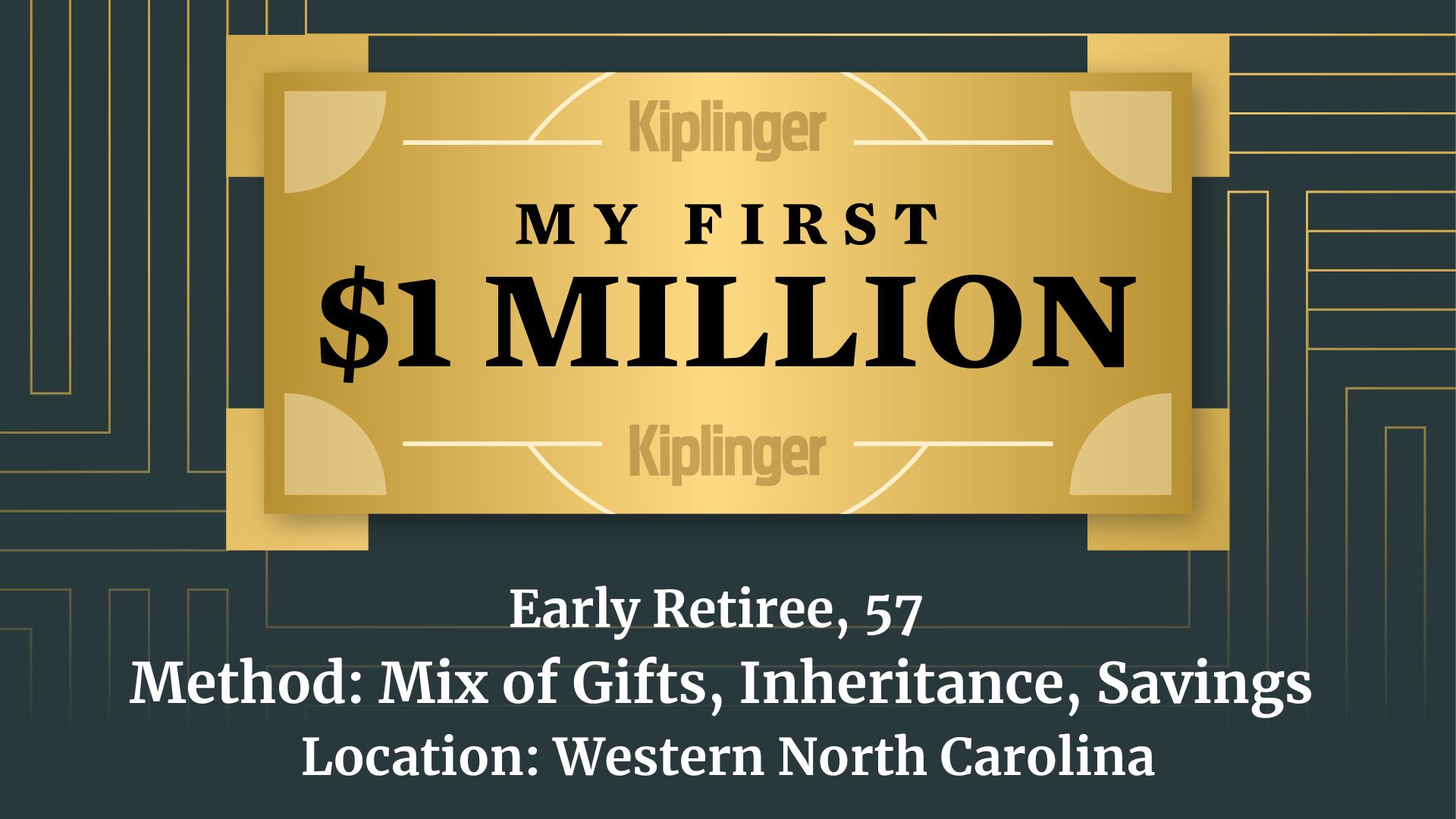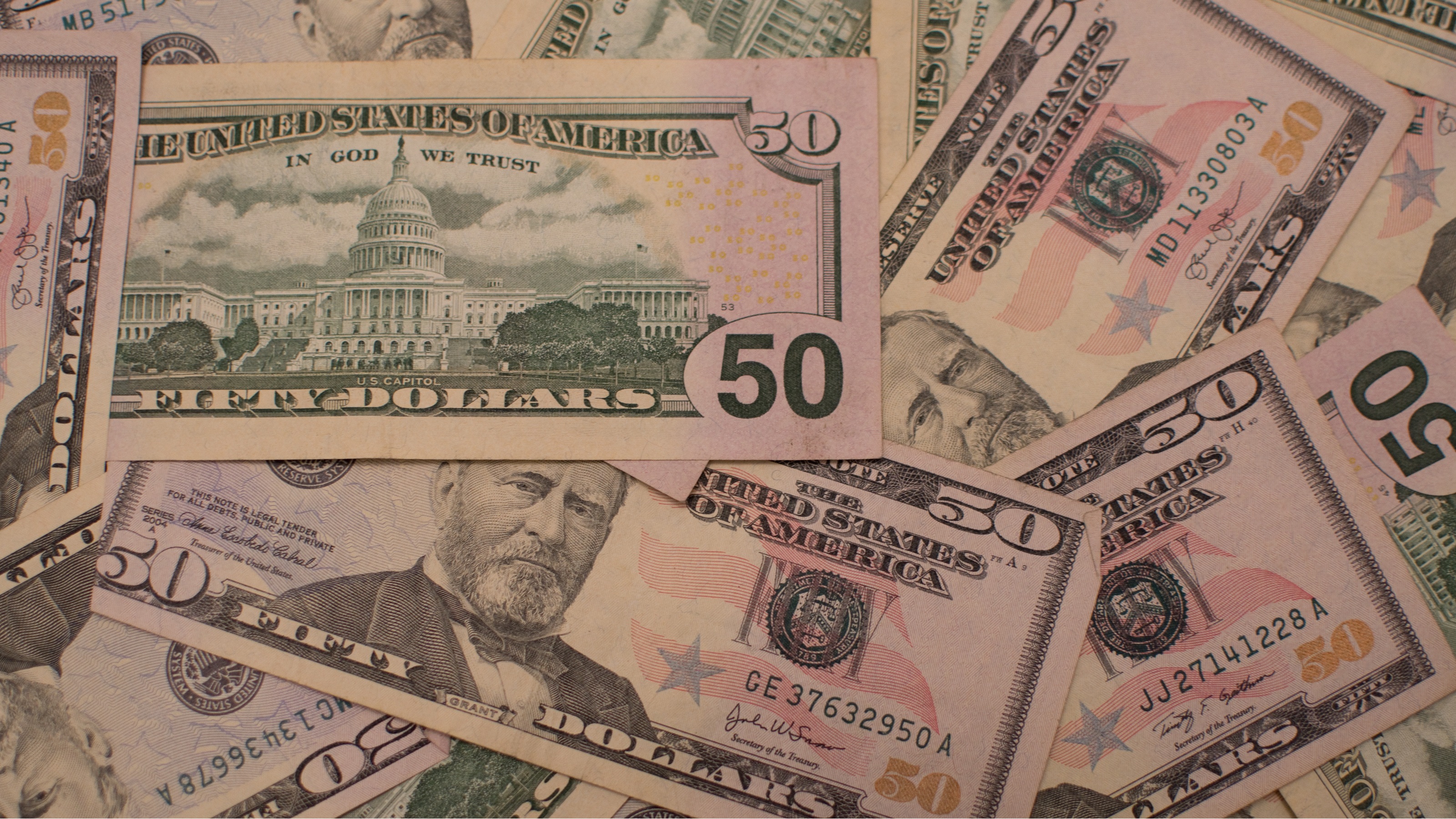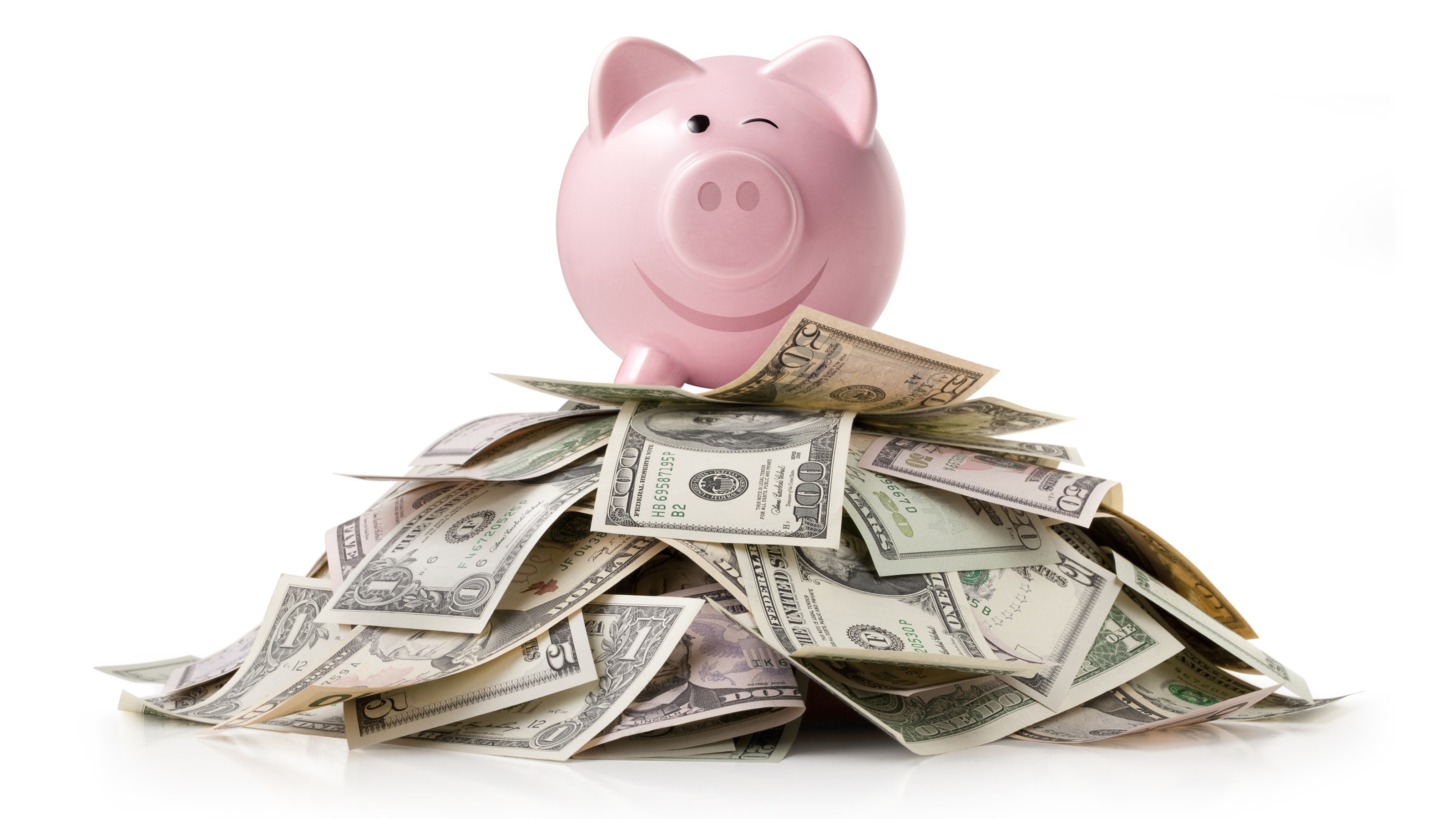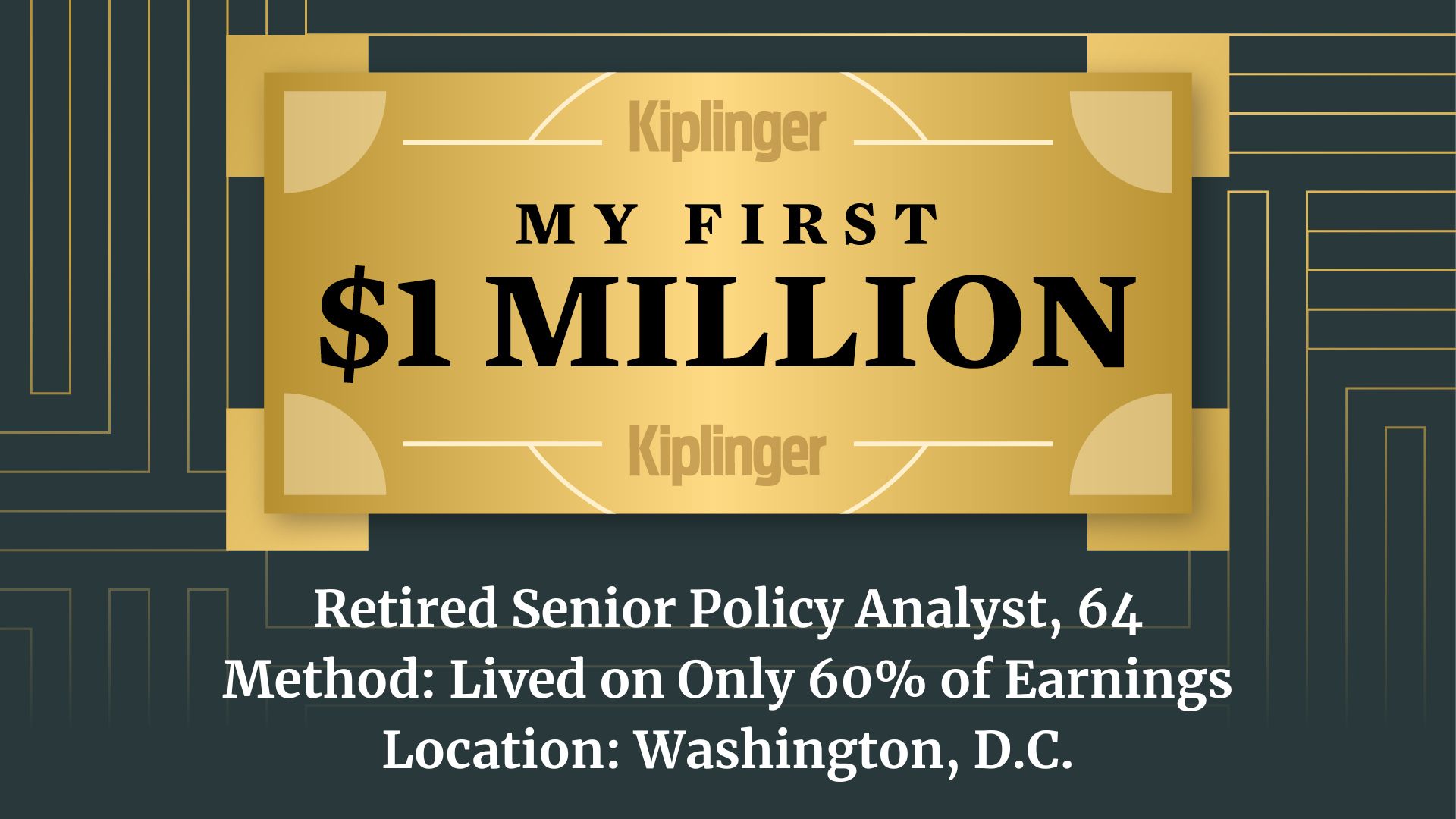My First $1 Million: Early Retiree, 57, Western North Carolina
"I was tempted in my 20s to sell that stock I'd been given and buy a Corvette, but I resisted the urge, and I'm happy with how that worked out."


Profit and prosper with the best of Kiplinger's advice on investing, taxes, retirement, personal finance and much more. Delivered daily. Enter your email in the box and click Sign Me Up.
You are now subscribed
Your newsletter sign-up was successful
Want to add more newsletters?
Welcome to Kiplinger’s My First $1 Million series, in which we hear from people who have made $1 million. They’re sharing how they did it and what they’re doing with it. This time, we hear from a 57-year-old former assistant director of a university program who lives in Western North Carolina.
See our earlier profiles, including a writer in New England, a literacy interventionist in Colorado, a semiretired entrepreneur in Nashville and an events industry CEO in Northern New Jersey.
Each profile features one person or couple, who will always be completely anonymous to readers, answering questions to help our readers learn from their experience.
From just $107.88 $24.99 for Kiplinger Personal Finance
Become a smarter, better informed investor. Subscribe from just $107.88 $24.99, plus get up to 4 Special Issues

Sign up for Kiplinger’s Free Newsletters
Profit and prosper with the best of expert advice on investing, taxes, retirement, personal finance and more - straight to your e-mail.
Profit and prosper with the best of expert advice - straight to your e-mail.
These features are intended to provide a window into how different people build their savings — they're not intended to provide financial advice.
THE BASICS
How did you make your first $1 million?
It's really been a mix of things. When I was in college, a relative gave me a gift of some stock, which I still own today. I've been getting regular quarterly dividends from it for 40 years.
That helped me get over any fear I had about potentially losing money in stocks, and owning it through the October 1987 crash taught me a lot about hanging on through market turmoil.

Then, when I graduated from college, I won an academic prize that allowed me to pay my undergraduate debt and put me through grad school.
Shortly after I graduated from grad school, my grandfather died, and he left about $75,000 to each grandchild. I used that money largely for two things: a brand-new Ford Ranger that I owned for the next 21 years and a down payment on a house.
I had a lucky head start on personal finances: a graduate degree, no debt and homeownership in my mid-20s.
I also had good examples of how to manage personal finance in my family. My mother encouraged me to open a traditional IRA at age 20, and I made the maximum contribution annually throughout my career.
When the Roth IRA was created, I contributed the maximum annually to that.

I started putting an extra $50 per paycheck into a supplemental retirement 457(b) account. That account is now worth about $125,000. (From investing just $50 every two weeks!)
I also sat down in my 20s and wrote a hopelessly optimistic financial plan. I had about $10,000 in my IRA, and I figured that if I added $2,000 annually for five years, I ought to have at least $20,000 by age 31.
After that, I thought I should be able to double my assets every five years and add another $10,000 in contributions. So, $50,000 at age 36, $110,000 at age 41, $230,000 at age 46 and so on.

I could see how (in theory at least) the numbers would climb stratospherically in my 50s, from $470,000 at age 51 to $1.89 million at age 61. My IRA alone did not grow that wildly.
But I also saved more than that initial projection of $2,000 a year through higher annual IRA limits, that 457(b), a 403(b) and investments in regular taxable mutual funds and ETFs, and my overall net worth has exceeded the projections I made when I was 26.
Although I was overly optimistic on the returns I expected (we had a good run in the ’90s!), I also underestimated how much I would actually save annually.
What are you doing with the money?
I retired early (at 54). During the COVID pandemic, I was working remotely, and with the extra time I gained by giving up a long commute, I tried every possible retirement calculator and built a retirement budget.
I also figured out while doing all that calculating that with the budget I set and the assets I had, I could live to be 102 (10 years older than my grandfather lived to be) and would likely end up with a much larger inflation-adjusted net worth than when I started.

The big realization for me was that if I kept working for a few more years, as I had originally planned, I would have less time with the person I love, and I would die with more money in the bank.
I didn't see the point of missing quality time with loved ones just to run up my investments beyond what I need to live, so I retired when I could use the Rule of 55.
I still have a large percentage of my portfolio in the stock market, but I like to have enough cash and bonds to last me two to three years to hopefully get through most major market downturns. I'm sure I will rethink my mix as I get older.
THE FUN STUFF
Did you do anything to celebrate?
Nothing big. I think I treated myself to a nice dinner out — and didn't tell my date that it was for anything special.
What is the best part of making $1 million?
The freedom to retire early and the time to do retirement projects, like renovating the fixer-upper home I bought to start my retirement in.
Did your life change?
On the one hand, it didn't, because it took so long to get there that my annual spending and overall lifestyle are very similar now to what they were before I crossed that threshold. I still drive the same 2011 Ford Ranger (my second Ranger), which I bought used 11 years ago.
On the other hand, it did, because my life has changed a lot: Four years after I crossed that threshold, I retired from a career that I really enjoyed and still miss sometimes, and all my time is now free for me to do whatever I want.

LOOKING BACK
Anything you would do differently?
Probably not. As I think back, I've always been happy with my lifestyle. I could spend more than I currently do, but I don't need to spend more to be happy. I don't feel like I skipped anything or missed out earlier in life. And I like where all my earlier decisions have put me now.
I realize that I had some things handed to me early in life, but I also chose to use what I'd been given responsibly. I was tempted in my 20s to sell that stock I'd been given and buy a Corvette, but I resisted the urge, and I'm happy with how that worked out.
Did you work with a financial adviser?
I don't work with a financial adviser. I've gotten used to picking my own investments over the years and never really felt the need to work with a financial planner or adviser.
But I've been reading Kiplinger monthly for nearly four decades, and that has offered me a lot of good advice over the years.

Did anyone help you early on?
My parents, who taught me a lot about personal finance and how to do my own taxes, and my great-aunt, who gave me shares of stock, which introduced me to investing in general.
LOOKING AHEAD
Plans for your next $1 million?
No major plans, really. My net worth crossed $1 million seven years ago, in 2018, and reached $2 million near the end of 2024. I have looked at a couple of sports cars, but they get terrible mileage.
I keep putting it off, but at some point I really should start thinking about where I want the money to go someday after I'm gone. I don't currently have a will, and I don't have children, so I'd like to leave a lot to charitable causes.
Any advice for others trying to make their first $1 million?
Go slow and steady. Go back to my earlier comment that I put $50 from each paycheck into a tax-deferred retirement account, and that account is now worth over $125,000. That shows the amazing power of compounding over time.

The way to do that is to consistently spend less than you make. I've never carried credit card debt or had a car payment. (My grandfather told me once, "Always pay cash for a car.")
If you have something left over to invest at the end of each month, it grows over time, and one day you'll be amazed at what it adds up to.
What do you wish you'd known …
When you first started saving? I've always been kind of a saver (even when I was a kid, my parents encouraged me not to spend all of my allowance, and I had a small savings account at the local bank), so it's a habit that’s always been ingrained in me.
When you first started investing? When I bought my first house, I used to make extra payments toward the principal. That wasn't a bad thing to do, but I wish I had known then how much further ahead I would have ended up had I put that same money into a mutual fund instead.

When I bought my current house, I put 20% down and got a fixed rate under 3%. I'm in no hurry to pay it off early.
I expect that the money I have invested will grow a lot more over time than what I would save in mortgage interest if I pulled it out to pay down the mortgage.
Before you retired? How much I would enjoy it. I'm about three years into it, and I haven't run out of things to do yet.
If you have made $1 million or more and would like to be anonymously featured in a future My First $1 Million profile, please fill out and submit this Google Form or send an email to MyFirstMillion@futurenet.com to receive the questions. We welcome all stories that add up to $1 million or more in your accounts, although we will use discretion in which stories we choose to publish, to ensure we share a diversity of experiences. We'll also want to verify that you really do have $1 million. Your answers may be edited for clarity.
RELATED CONTENT
- You're 62 Years Old With $1 Million Saved: Can You Retire?
- Want to Earn $1 Million More Over Your Lifetime? Do This
- Do You Have at Least $1 Million in Tax-Deferred Investments?
- Are You Rich? U.S. Net Worth Percentiles Can Provide Answers
- Compare Your Net Worth by Age
Profit and prosper with the best of Kiplinger's advice on investing, taxes, retirement, personal finance and much more. Delivered daily. Enter your email in the box and click Sign Me Up.

As Contributed Content Editor for the Adviser Intel channel on Kiplinger.com, Joyce edits articles from hundreds of financial experts about retirement planning strategies, including estate planning, taxes, personal finance, investing, charitable giving and more. She has more than 30 years of editing experience in business and features news, including 15 years in the Money section at USA Today.
-
 4 High-End Experiences Worth the Splurge After 50
4 High-End Experiences Worth the Splurge After 50These curated date ideas provide the perfect backdrop for couples ready to enjoy the very best that the world has to offer.
-
 Health Care Stocks Have Sagged. Can You Bet on a Recovery?
Health Care Stocks Have Sagged. Can You Bet on a Recovery?The flagging health care sector has perked up a bit lately. Is it time to invest?
-
 Costco's Auto Program: Can Membership Pricing Really Save You Money on a Car?
Costco's Auto Program: Can Membership Pricing Really Save You Money on a Car?Costco's Auto Program can simplify the car-buying process with prearranged pricing and member perks. Here's what to know before you use it.
-
 What Is an Assumable Mortgage and Could It Save You Thousands?
What Is an Assumable Mortgage and Could It Save You Thousands?With mortgage rates still elevated, taking over a seller’s existing home loan could lower monthly payments — if the numbers work.
-
 Have You Fallen Into the High-Earning Trap? This Is How to Escape
Have You Fallen Into the High-Earning Trap? This Is How to EscapeHigh income is a gift, but it can pull you into higher spending, undisciplined investing and overreliance on future earnings. These actionable steps will help you escape the trap.
-
 I'm a Financial Adviser: These 3 Questions Can Help You Navigate a Noisy Year With Financial Clarity
I'm a Financial Adviser: These 3 Questions Can Help You Navigate a Noisy Year With Financial ClarityThe key is to resist focusing only on the markets. Instead, when making financial decisions, think about your values and what matters the most to you.
-
 Where Olympians Store Their Medals is a Great Lesson For Your Valuables and Cash
Where Olympians Store Their Medals is a Great Lesson For Your Valuables and CashWhat you can learn about protecting your cash and values from where Olympians store their medals.
-
 An Executive's 'Idiotic' Idea: Skip Safety Class and Commit a Federal Crime
An Executive's 'Idiotic' Idea: Skip Safety Class and Commit a Federal CrimeSeveral medical professionals reached out to say that one of their bosses suggested committing a crime to fulfill OSHA requirements. What's an employee to do?
-
 How You Can Use the Financial Resource Built Into Your Home to Help With Your Long-Term Goals
How You Can Use the Financial Resource Built Into Your Home to Help With Your Long-Term GoalsHomeowners are increasingly using their home equity, through products like HELOCs and home equity loans, as a financial resource for managing debt, funding renovations and more.
-
 How to Find Free Money for Graduate School as Federal Loans Tighten in 2026
How to Find Free Money for Graduate School as Federal Loans Tighten in 2026Starting July 1, federal borrowing will be capped for new graduate students, making scholarships and other forms of "free money" vital. Here's what to know.
-
 My First $1 Million: Retired Senior Policy Analyst, 64, Washington, D.C.
My First $1 Million: Retired Senior Policy Analyst, 64, Washington, D.C.Ever wonder how someone who's made a million dollars or more did it? Kiplinger's My First $1 Million series uncovers the answers.